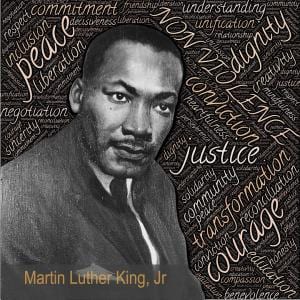
It’s common for those criticizing social justice efforts to accuse those promoting social justice as being Marxists (either as socialists or as communists). Sometimes, various Marxists join in social justice causes, when the cause connects with a Marxist desire or objectives. But that doesn’t make social justice Marxist, for there are more than Marxists involved with social justice activities. Indeed, while they can work with Marxists for common goals, many involved in social justice activities nonetheless denounce Marxism as well, seeing Marxist ideology also gets many things wrong and would also end up promoting various forms of social injustice.
Those who engage social justice come from a wide variety of beliefs and practices. They can work together when they seek for a common goal, but when their goals diverge, they likewise, diverge from each other and go their separate ways. The fact that some of them are Marxists does not make them all Marxists, and indeed, if one examined what was being said and done by all those working together for a common cause, that would be made clear. The reasons they offer for doing what they do will differ. Yes, they will have some things in common, the same way a tank will have much in common with an automobile, but the differences, when investigated, will show how and why many engaging in social justice cannot credibly accused as being Marxists, even as an automobile cannot be credibly claimed as being a tank.
Those who enjoy unjust privilege in society, those who will be asked to put aside that privilege but do not want to do so, like to associate the whole of social justice with the Marxists, knowing the way people have been trained to fear Marxism without really knowing what Marxism is all about. Marxism has become a boogieman – accuse someone of being a Marxist (or socialist or communist), and that is enough for many to have them dismissed without giving them a hearing. Marxism is assumed to be totally and completely wrong, and anyone who is accused of being a Marxist, associating themselves with Marxists, must therefore also be rejected. If someone accused of being a Marxist denies it, their association with potential Marxists is seen as proof that they are lying, and are secretly Marxists. If only our education system taught people logic and logical fallacies, they would be able to detect the kinds of fallacies employed by such arguments, which would include but not be limited with guilt by association, poisoning the well, and ad hominem.
Christians, because of the atheistic materialism associated with Marxism, cannot and will not agree with everything Marx and Marxists teach. They will, however, find many elements which they stand in agreement with Marxists, and this should not be a surprise, since Marxism borrowed much from Jewish and Christian traditions. Many of the criticisms, many of the issues, which Marxists raise, Christians can and should raise. Scripture is concerned with the plight of the poor and the oppressed. Jesus, in the Sermon on the Mount, solidified that concern. Jesus warned the rich that what unjust joys they have now can and will be taken from them. Those who are mistreated and ignored will be the first in the kingdom of God. The oppressed find God is by their side, and the oppressors either have to change their ways and repent, or they will suffer the consequences of their oppression. This is what promotes Christian engagement with social justice. Because the concerns Christ raised are similar with the concerns that Marxists raise, Christians should have no problem working with Marxists insofar as they raise those concerns together, and work on solutions which both sides think just. Marxist atheism, Marxist materialism, of course, will be denied, though even then, not all that Marxists say need to be considered wrong: many abuse religion and use it to oppress others and Christians should see that as a problem and work to correct it. Nonetheless, this would not make such Christians who do this as being Marxists, for they will still have fundamental differences with Marxists, differences which the Christians will make clear even when working with Marxists. Thus, when Martin Luther King Jr. acknowledged elements of Marxist criticism and worked with communists, he preached that Christians could not be communists:
Now, let us begin by answering the question which our sermon topic raises: Can a Christian be a communist? I answer that question with an emphatic “no.” These two philosophies are diametrically opposed. The basic philosophy of Christianity is unalterably opposed to the basic philosophy of communism, and all of the dialectics of the logician cannot make them lie down together. They are contrary philosophies.[1]
Martin Luther King Jr., despite making it clear that he could not and would not support communism because it diverted greatly from the Christian faith, nonetheless was constantly accused of being a communist. Thus, when FBI files concerning Martin Luther King Jr. were released, we find that this was indeed one of the claims being made about him:
It alleges that King’s political ideologies and the creation of his civil rights organization, the Southern Christian Leadership Conference, were heavily influenced by communists, specifically the Communist Party USA. The FBI document went into great detail about one of King’s most trusted advisers, Stanley Levison, a New York lawyer and businessman who served as a top financier for the Communist Party years before he met King in 1956.[2]
Here, we see the tactic used against social justice leaders was used against King. He was “influenced” by communists. He had close associates who were communists. So, it was easy to accuse him of being a communist, ignoring what he said and did to the contrary. He was critical of capitalism, like communists, so he must have been a communist. However, it is clear King’s response against capitalism was similar to that of his response against communism. He thought Christianity went beyond both, and to embrace one or the other would lead to grave problems in the world. Those who were challenged by his criticism of capitalism and the exploitation which took place under capitalist regimes found the easiest response was to accuse him of being a communist, ignore his words to the contrary (or claim he was lying), and hope that would be good enough to derail his pursuit for justice.
This tactic continues to be with us today. Within the Black Lives Matter movement, we find a diverse group of people, with diverse beliefs and practices. And yet, we see the movement as a whole as being labeled as a communist movement by its critics. They point out how some members of the Black Lives Matters movement connect themselves with Marxism, thereby equating everyone in the movement with Marxism.[3] But, as Tom Kertscher reported for PolitiFact, the movement is diverse, and what brings the people together is their rejection of racism and the oppression and abuse which follows such racism: “But the movement has grown and broadened dramatically. Many Americans, few of whom would identify as Marxists, support Black Lives Matter, drawn to its message of anti-racism.”[4]
Black Lives Matters transcends any individual person in the movement; it is about fighting for the dignity of the human person, of all human persons, by dealing with and fighting those who have suffered grave indignities, those whose lives have not been treated as if they mattered, because they were African Americans. Of course, those with privilege, those who fear justice, will demean the movement and call them Marxists because of Marxists within the movement, hoping that will derail the movement; but those who suffer injustice do not care about such ideological fights, and far from going away, they find every new instance of such injustice only fuels their desire for justice, recognizing that those who would stand in their way with false claims about the movement only act as oppressors normally act, justifying themselves through lies, proving the need for the movement itself.
Sadly, Christians, far from having a united front against social justice, find themselves fighting each other, some promoting social justice, following Scripture and the Christian moral tradition, and others fighting against social justice, following privilege and the ideologies which they have been led to believe. Christians who speak out against racism, those who promote the objectives of Black Lives Matters, find themselves attacked as communists, just like Martin Luther King Jr. did, and their work is said to be too controversial to be supposed by Christian organizations. Thus, when Gloria Purvis showed her support to the objectives behind the Black Lives Matters movement, that is, to overturn and reject the place of racism in society, she found herself silenced, and accused of being a “leftist” or “Communist” because she promoted social justice. Her show was let go from EWTN, and those who resist social justice, rejoiced, saying she was too controversial, promoting “leftist policies like reparations….”
How did social justice, and with it, repairing the harm done by sin, become “leftist?” Christian theology teaches that those who sin must make restitution for what they have done. Reparation for sin is a part of the process of penance. The Pontifical Council for Peace and Justice made this point in 2001:
As far as possible, reparation should erase all the consequences of the illicit action and restore things to the way they would most probably be if that action had not occurred. When such a restoration is not possible, reparation should be made through compensation (equivalent reparation). This is the most common form of reparation, but the calculation of the compensation is often difficult. When compensation does not suffice to make reparation for a moral injury, moral reparation can be made, that is satisfaction. An example of this is the offering of an apology or expression of regret to the victim State by the State responsible for the wrong. [5]
Pope Francis, likewise, stated the need for those who have sinned, those who have harmed others, to repent and help repair the harm they have done to the world; reconciliation is important, and we need to be able to come together and even forgive each other, but that forgiveness does not remove the need for reparations; rather reparation is included in reconciliation:
Let us renounce the pettiness and resentment of useless in-fighting and constant confrontation. Let us stop feeling sorry for ourselves and acknowledge our crimes, our apathy, our lies. Reparation and reconciliation will give us new life and set us all free from fear. [6]
Racism is a grave sin, a grave injustice. It destroys lives. It destroys the dignity of the human person. “Racism is a virus that quickly mutates and, instead of disappearing, goes into hiding, and lurks in waiting.”[7] To confront racism, we must admit the harm it has done, the harm it continues to do. Then, we will recognize that to overcome racism, we must do more than stop people from overt racism, but also, we must fight hidden racism, systematic racism, which tries to keep the power structures formed by racism remain in power. We must truly heal the damage which racism has brought to the world. Those who reject the need for restitution for the crimes of racism, those who reject reparations, end up promoting racism, because they continue to support the privilege racism gives to those in power.
Catholic media, far from being silent on racism, far from being silent on systematic racism, far from being silent on the need for reparations in order to bring about a just society, needs to be at the forefront of the work for justice, working to help restore the dignity and livelihood which racism has taken away from many within society. Thus, Pope Francis, speaking to those involved with Catholic media, said:
We need media that can help people, especially the young, to distinguish good from evil, to develop sound judgments based on a clear and unbiased presentation of the facts, and to understand the importance of working for justice, social concord and respect for our common home. We need men and women of conviction who protect communication from all that would distort it or bend it to other purposes.[8]
Social justice, which includes confronting racism and healing the damage done by it, must be a part of the message given by Christian media. Instead of promoting outrageous claims of communism, socialism, or Marxism, against those who work for social justice, instead of firing those who follow Christ in promoting justice for the oppressed, Christian media must promote those who do such work and raise their voice further. When some Christian media source works to silence such voices and encourage disingenuous attacks on social justice, such media must be seen, not as working for Christ and Christ’s ways, but as an imposter, and indeed, as being the one who truly supports an anti-Christian ideology which must be rejected. Insofar as they fight against the teachings of the prophets, the teachings exemplified by the Sermon on the Mount, so-called Christian voices stand not with Christ, but against him, serving the spirit of the anti-Christ.
Christians must promote social justice. They must work with all those of good will, including those who hold positions contrary to their own, so long as doing so will work to promote the common good. This is how Christians should get things done in the world. They are not meant to flee the world and let it get worse; rather, they are expected to bring God’s grace to the world, helping to perfect it through that grace. That is, after all, what God did with the incarnation.
[1] Martin Luther King Jr, “Can a Christian Be A Communist? Sermon Delivered at Ebenezer Baptist Church” (9-30-1962). Found at: https://kinginstitute.stanford.edu/king-papers/documents/can-christian-be-communist-sermon-delivered-ebenezer-baptist-church
[2] Kristine Philips, “In The Latest JFK Files: The FBI’s Ugly Analysis On Martin Luther King Jr., Filled With Falsehoods,” in The Washington Post (11-4-2017).
[3] While it is true some suggested they were trained in Marxist thought, that is not the same as saying they were Marxists, let alone indicating the whole movement was Marxist.
[4] Tom Kertscher, “PolitiFact: Is Black Lives Matter a Marxist Movement?” in Tampa Bay Times (7-22-2020).
[5] Pontifical Council for Justice and Peace, “Contribution To World Conference Against Racism, Racial Discrimination, Xenophobia And Related Intolerance.” Vatican translation (Durban, 31 August – 7 September 2001). ¶12.
[6] Pope Francis, Fratelli tutti. Vatican translation. ¶97.
[7] Pope Francis, Fratelli tutti, ¶78.
[8] Pope Francis, “Message To The Catholic Media Conference Sponsored By The Catholic Press Association.” Vatican translation. (6-30-2020).
Stay in touch! Like A Little Bit of Nothing on Facebook.
If you liked what you read, please consider sharing it with your friends and family!













